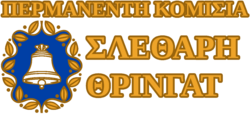Standing Committee of the Sletharine Thringat
Standing Committee of the Sletharine Thringat Περμανεντη Κομισια Σλεθαρηι Θρινγατ | |
|---|---|
| 9th Convocation of the Standing Committee of the Sletharine Thringat | |
 Logo of the Thringat Standing Committee | |
| Type | |
| Type | |
| Leadership | |
Speaker of Thringat | |
Prime Minister | |
| Structure | |
| Seats | 80 |
 | |
Political groups | Political Quorum (65)
Imperial Quorum (15)
|
Length of term | 2 years |
| Elections | |
| Indirect modified block combined approval voting | |
First election | October 2007 |
Last election | October 2021 |
Next election | October 2023 |
| Meeting place | |
 | |
| Eshtarine Castle, Lōpsus | |
The Standing Committee of the Sletharine Thringat (Sletharine: Περμανεντη Κομισια Σλεθαρηι Θρινγατ; romanized: Permanentė Komiſia Slethari Thringat), usually referred to by its initials PKSTh (Sletharine: ΠΚΣΘ; romanized: PKSTh), is the standing committee of the Sletharine Thringat. It is the official standing legislative body, taking care of the legislative affairs at the times when the parliament at large is at recess, but in fact, it shares this fucntion with the Imperial Circle of Slethar, an informal body of the Imperial Quorum.
Elections
The Standing Committee is elected in an indirect elecction, using a modified modified block combined approval voting. The members of the Standing Committee are elected from among the members of the Thringat. A total of 60 members is elected by the Political Quorum's representation in the Thringat, 15 members are elected by the Imperial Quorum's representation in the Thringat. The remaining 5 seats are reserved for the Prime Minister, the Speaker of Thringat and 3 vice-speakers, which are guaranteed membership in the Standing Committee ex officio.
The elections take place three times in a regular convocation. The Standing Committee has a term of 2 years, while the Thringat has a term of 6 years. That means, that per each one convocation of the Thringat, three convocations of the Standing Commitee happen. Past convocations include:
| Thringat | Order | From | To | |
|---|---|---|---|---|
| — | 1st | November 2006 | October 2009 | |
| 1st | 1st | 2nd | October 2007 | October 2009 |
| 2nd | 3rd | October 2009 | October 2011 | |
| 3rd | 4th | October 2011 | October 2013 | |
| 2nd | 1st | 5th | October 2013 | October 2015 |
| 2nd | 6th | October 2015 | October 2017 | |
| 3rd | 7th | October 2017 | October 2019 | |
| 3rd | 1st | 8th | October 2019 | October 2021 |
| 2nd | 9th | October 2021 | October 2023 | |
| 3rd | 10th | October 2023 | October 2025 | |
Legislative process
The legislative process used by the Standing Committee is almost identical like the Thringat. The main difference is, that all decisions undertaken require an absolute majority (41 members) instead of the majority of just those present to pass a bill into a "provisional law".
In order for the provisional law to become a permanent law, it must be approved on a session of the Thringat at large in a yes-or-no vote by a simple majority. If it is rejected, the provisional law is considered overwritten and is no longer in effect.
First reading
During the first reading, the proposal as worded by the proposing party (usually one of the bureaus, but it can also be one of the quorums or the Emperor himself) and discussed the wording of the proposal. The discussion serves to amend and update the bill in order to solve any problems with the bill. The first reading ends after the Standing Committee votes with a simple majority in favor of a new wording, or rejects all amendment proposals.
Second reading
The second reading consists of a simple discussion about the fruition of the proposal, and is followed by a simple yes-or-no vote, using absolute majority oéf 41 seats. If the bill is passed, it has to be marked with the Imperial seal in order to become a law. This seal is owned by the Emperor, giving him the right to veto any piece of legislation. Besides this, the members of the Imperial Quorum present in the Standing Committee have the right to veto a piece of legislation if at least 10 of them (of 15 total) vote against a proposal.